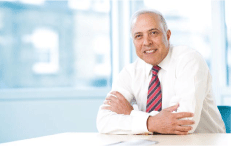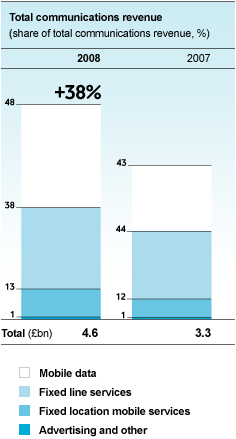Chief Executive’s Review
Review of the year

We have made strong progress over the past year with our strategy and met or exceeded our stated financial expectations in all areas.
Our cash flow generation remains strong, supporting our robust financial position and shareholder returns, with free cash flow of £5.5 billion. Adjusted earnings per share increased by 11.0% to 12.50 pence, enabling dividends per share to increase by 11.1% to 7.51 pence.
Group revenue increased by 14.1% to £35.5 billion, or 4.2% on an organic basis. In Europe, organic revenue growth was 2.0% with competitive and regulatory pressures continuing to impact on solid underlying growth. EMAPA delivered further strong growth with revenue increasing by 45.1%, or 14.5% on an organic basis, with double digit growth across many markets. Group adjusted operating profit increased by 5.7% to £10.1 billion, with a continued strong contribution from Verizon Wireless in the US, which continues to be an important and attractive market. We remain committed to our investment in Verizon Wireless, which continues to perform very well on all key metrics, with constant currency growth of 14.5% in revenue and 24.8% in adjusted operating profit and market leadership in contract customers, churn and profitability.
We invested £5.1 billion in capitalised fixed asset additions, including £1.0 billion in our operations in India, in line with our plans, to support the rapid growth.
Vodafone now has over 260 million proportionate mobile customers worldwide with strong growth during the year in our EMAPA region, in particular in our new business in India which has been successfully integrated into the Group and now has over 44 million customers, with over 50% pro forma revenue growth.
In a challenging operating environment, we are stimulating greater usage and introducing new services to offset falling prices and continue to drive cost efficiency across the Group. Importantly, we have positioned ourselves to deliver total communications to our customers by investing significantly in our mobile broadband networks, establishing fixed broadband capability across our European markets and developing services specifically for the mobile internet.
There have been a number of key achievements against our five strategic objectives in the last 12 months which are discussed below, together with an overview of how the communications environment is evolving and why we believe Vodafone is uniquely positioned to succeed.
Revenue stimulation and cost reduction in Europe
| Strategic objectives |
|---|
| Revenue stimulation and cost reduction in Europe |
| Innovate and deliver on our customers’ total communications needs |
| Deliver strong growth in emerging markets |
| Actively manage our portfolio to maximise returns |
| Align capital structure and shareholder returns policy to strategy |
Our core revenue initiatives continue to focus on offering innovative tariffs, larger minute bundles and targeted promotions to stimulate additional usage as well as improving customer lifetime value. Overall, voice usage increased by 16.7% in the year, with good growth across our major markets. We are particularly strong in the business segment where our unique footprint and innovative services have enabled us to create a market leading position, which we strengthened earlier in the year by establishing Vodafone Global Enterprise to service our largest multinational customers.
Pricing pressure from competition and regulation remains strong, with a 15.8% fall in the effective voice price per minute for our Europe region, offsetting the benefits from growth in usage.
Messaging revenue increased by 8.1% on an organic basis, with a 28.1% increase in the total number of text and picture messages sent. This reflects strong performances in the year in Italy and the UK, primarily through targeted promotions and tariffs.
In 2006, we set out a number of core cost reduction programmes that are now delivering results and have contributed to the key cost targets we met this year, with savings of around £300 million during the year, bringing the cumulative savings to date to around £550 million. We have achieved mobile capital expenditure at 10% of mobile revenue for 2008, with important contributions from centralising key purchasing activities and consolidating our data centres, while having enhanced the speed and data capability of our mobile networks. These programmes, together with the outsourcing of certain IT operations, have also contributed to maintaining broadly stable operating expenses for 2008 compared to 2006. This has been achieved in a period when customers have increased on an organic basis by 19%, voice minutes by 36% and data volumes by over tenfold.
Innovate and deliver on our customers’ total communications needs

Our strategy is to expand beyond our core mobile services to offer a choice of communications, entertainment and internet services, with a focus on four key areas. These areas generated around 13% of Group revenue this year and we expect this to increase to around 20% in 2010.
Over the year, data revenue increased by 40.6% on an organic basis to £2.2 billion, principally driven by continued strong growth in business email and PC connectivity devices, which in total nearly doubled to 5.8 million. We have seen strong take up this year of USB modems, which provide easy to use mobile broadband access for PCs and laptops to consumers and business customers. For consumers, we also took the opportunity to refresh our mobile internet offerings during the year in eight markets, resulting in 2 million customers signing up to flat rate mobile internet access.
Our data revenue growth is being enabled by the investment in our 3G networks which now offer up to 3.6 Mbps and by the end of the year will begin to offer 14.4 Mbps, which will provide a compelling alternative to fixed broadband for many customers. We have a clear technology path which will ultimately lead to 4G technology but not before 2010. Unlike the transition from 2G to 3G, we are shaping 4G today together with Verizon Wireless and China Mobile to ensure a smoother transition for the industry, with no step change in cost.
In addition, some customers need the data speeds of fixed broadband and during the year we established fixed broadband capability in our European markets as part of our strategy to deliver total communications. We are leveraging our brand, distribution and customer relationships to provide an attractive, integrated proposition. At the end of the year we had 3.6 million fixed broadband customers in 13 markets, principally in Germany and in our newly acquired businesses in Italy and Spain.
We are substituting fixed line voice services for mobile in the home or the office by offering fixed location pricing plans giving customers fixed line prices when they call from within or around their home or office. We have made good progress over the year and now have 4.4 million Vodafone At Home customers and over 3 million Vodafone Office customers, up from 3.3 million and 2.3 million, respectively, a year ago.
Mobile advertising is another focus area for us and we have been trialling various business models, including targeted demographic advertising through display and search advertising, and now have agreements with over 40 leading brands. We believe mobile advertising represents a significant opportunity for us and, throughout the year, have put in place the right foundations to grow this business in the future.
Deliver strong growth in emerging markets
Our emerging market assets continue to perform well. Vodafone Essar in India is delivering very strong growth and performing in line with our acquisition plan. Revenue increased by over 50% during the year on a pro forma basis, driven by rapid expansion of the customer base, with an average of 1.5 million net customer additions per month since acquisition. We have also established an independent tower company with two other operators to drive further strong, cost efficient growth.
Vodacom recorded constant currency revenue growth of 16.9% from its market leading position in South Africa and strong growth in its southern Africa operations. We also saw revenue growth of 29.9% in Egypt, 20.3% in Romania and pro forma growth of 24% in Turkey, all on a constant currency basis. The value of our investment in China Mobile has increased by over 60% since the beginning of the year to £4.8 billion currently, with its customer base increasing 24% to 392.1 million and market penetration at 41%.
In addition to strong customer growth, we are differentiating ourselves through a number of initiatives. Most significantly, we are leveraging the Group’s scale to provide low cost handsets, which retail for as little as $20 and enable us to address developing economies without the need for subsidies. We shipped 7 million handsets in the year, mostly to India, making us the second largest supplier of handsets in that market.
Actively manage our portfolio to maximise returns
We completed the acquisition of Vodafone Essar in India in May 2007. We also strengthened our total communications offerings in Italy and Spain through the purchase of Tele2’s assets in those countries in December 2007 and in May 2008 acquired the minority interests in Arcor. In December 2007, we won the auction for the second mobile licence in Qatar through a consortium with the Qatar Foundation, in which we are the controlling partner. All our transactions are subject to strict financial criteria so as to deliver superior returns to our shareholders.
We now have 42 partner market agreements. These arrangements enable us to increase the presence of our brand and services without the need for direct equity investment, either because the investment opportunity does not exist or the returns are unattractive.
Align capital structure and shareholder returns policy to strategy
The Board remains committed to its policy of distributing 60% of adjusted earnings per share by way of dividend. Our robust financial and operating performance, together with a positive impact from foreign currency exchange rates, offset the dilution arising from the India acquisition and delivered 11% growth in adjusted earnings per share and therefore in dividends per share. Notwithstanding the increase in net debt to £25.1 billion, our long term credit ratings currently remain at low single A on average, in line with our Group policy.
